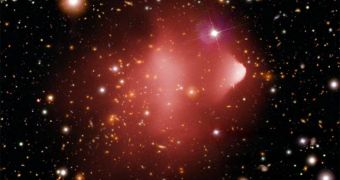While the most basic theories of physics help explain the world around us through rules, they also have the unsettling implication that the Universe, and naturally everything in it, should not exist. As we are aware, it does. This poses a quintessential dilemma to physicists trying to make sense of it all. At least in theory, at the beginning of the Cosmos, equal amounts of matter and antimatter should have been produced, and they should have canceled each other out. Obviously, they didn't, and now experts are poised to find out why. Advancements have been made in this field, but a clear answer is still far away.
Physicists working at the US Department of Energy's (DOE) Fermi National Accelerator Laboratory (Fermilab), in Batavia, Illinois, have been smashing together atoms in their large particle accelerator – the Tevatron – for more than eight years. During this prolonged experiment, they managed to obtain about equal amounts of matter and antimatter, which is an infinitesimal quantity of normal matter being extra produced. What experts are now trying to determine is whether this minute difference is enough to explain the very existence of the Universe.
Statistical analysis applied to the Fermilab team's results revealed that the one-percent difference between the amounts of matter and antimatter was not a result of chance. “We know that what we measured is more than what was previously known. Whether this is now sufficient to explain cosmological models, well, that's something theorists have to calculate,” University of Manchester physics expert Stefan Soldner-Rembold, who was a part of the team that carried out the experiments, explains. “We know there's this asymmetry in the Standard Model, but for the quantity measured it's really negligibly small,” he adds.
The Standard Model is the best theory we have to date of explaining the way the Universe is made up, and what its building blocks are. The Fermilab team is convinced that it accounted for minute background influences in its experiments, which may have hampered with the final results. The researchers say that the chance of them having made a mistake is below 0.1 percent, which in effect means that this is the most solid proof to date that the smallest exceptions allowed for in the Standard Model actually took place, Space reports.

 14 DAY TRIAL //
14 DAY TRIAL //